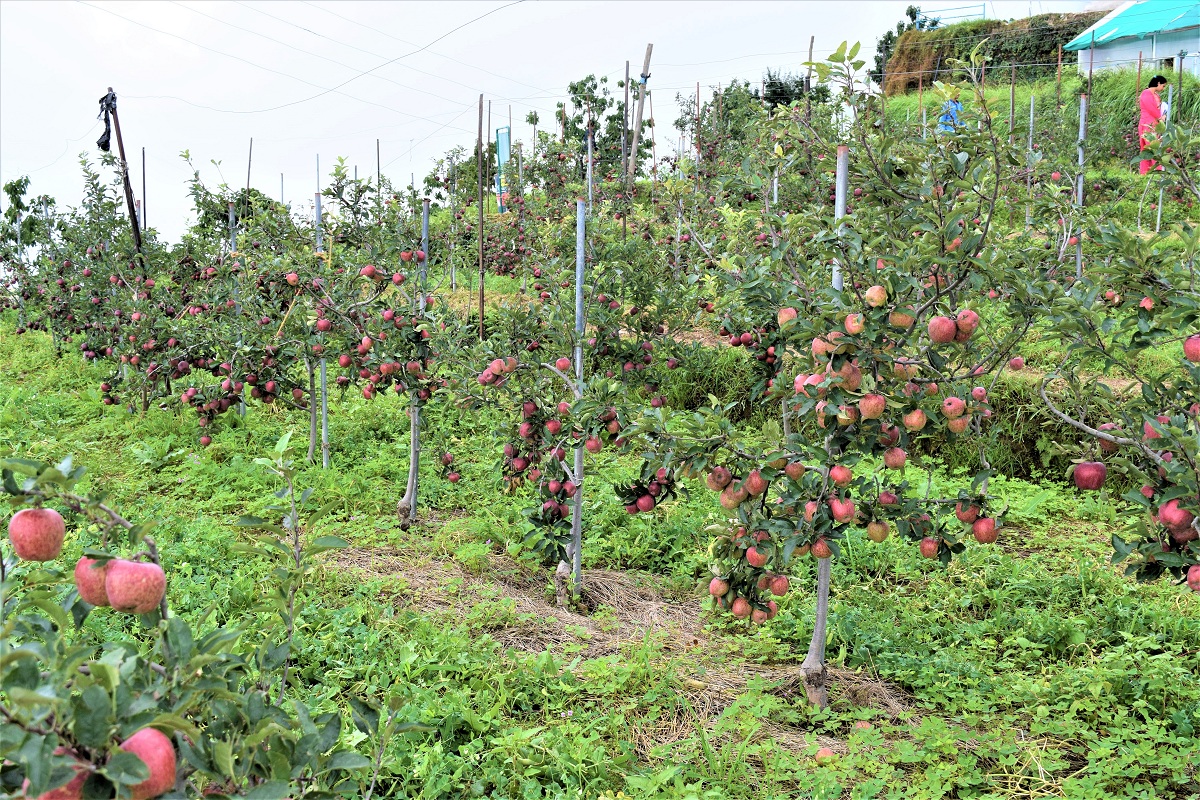It may just be a small beginning, but a good one, with apple growers in Himachal Pradesh evincing interest in ‘natural farming’, shunning the use of chemical fertilisers and pesticides in their orchards.
As many as 4,754 apple growers in the apple belt in Shimla district (which produces 70 per cent of the apple harvest in Himachal) have switched to the Subhash Palekar Natural Farming (SPNF) technique in their orchards, covering an area of 345.332 hectares over the last three years as a part of state government’s project.
Advertisement
In all, 6700 apple growers in the state have adopted SPNF (which involves a ‘desi cow’).
They are set to reap the benefits of apples grown with this natural technique, which requires lesser input and gives better output, in terms of ‘healthy fruit’ (which is sans any chemical sprays) and the price in the market.
“The growers are satisfied with results so far. They have been getting a better price for apples produced with natural farming through different link-ups even without certification. Once they are certified, as is the move, they will much higher price for their produce,” said an official with State Project Implementing Unit of ‘Prakritik Kheti Khushal Kisan’ Yojna, under which natural farming is being encouraged in Himachal.
More so, the natural farming of apples had reduced the requirement of labour by 61 per cent, the advantage that has come handy for the apple orchardists in COVID-19 crisis when labour availability has been an issue.
The apples produced in Himachal start flooding the market mid-July onwards. The Kinnaur apples come last in October. The apple economy of Himachal runs in Rs 4000-4500 crore, with around 1.5 lakh families associated with it. Shimla district produces 70 per cent of total apple in the state, followed by Kullu and Kinnaur. As per officials, apple is produced on 1.25 lakh hectares in the state with productivity as low as 3-4 tonnes per hectare.
The state generally contributes 30-40 per cent of total apple production in India, followed by Kashmir, which is at the top with 50 per cent production.
A good apple harvest in Himachal Pradesh means around four crore apple boxes (one box carries 20-22 kilograms of apple).
However, this year, the weather was adverse, so the production is slated to be lesser.
“Continuous rains during the flowering season of apple plants suddenly brought down the temperature, which hampered pollination process. The reoccurrence of apple scab (a disease) after 37 years in Himachal has also affected production and quality of apples this time,” said Dr SP Bhardwaj, noted Horticulture expert and former Joint Director, Horticulture with Dr YS Parmar, University of Horticulture and Forestry, Solan.
Field data available with Project Implementing Unit of ‘Prakritik Kheti Khushal Kisan’ Yojna, however, points out that the impact of scab was lesser in the apple orchards, which practised SPNF.
The impact of scab on leaves and fruit was 9.2 per cent and 2.1 per cent respectively in orchards following SPNF. In chemical farming, the impact of scab was 14.2 per cent on apple leaves and 9.2 per cent on fruits. Sudden leaf fall to the extent of 18 per cent was recorded on these apple plants.
“The farmers and apple growers, are being trained in SPNF technique in a phased manner in HP. It is yielding good results as many of them have switched to this practice. We now propose to engage farmers, who have successfully adopted it to spread it more,” said Dr Rajeshwar Chandel, Executive Director, Prakritik Kheti Khushal Kisan Yojna.
So far more than 54000 farmers, including vegetable and apple growers, have switched to natural farming practice (SPNF) in the state, while over 70,000 farmers have so far been trained.











